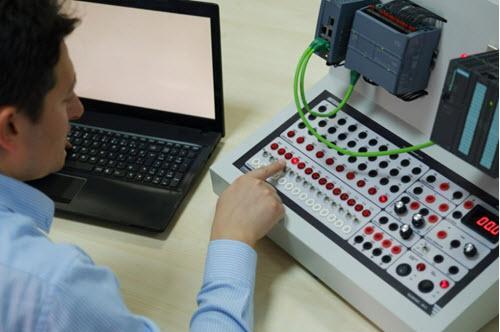How Do I Become a PLC Programmer?
Starting a new career is a fun and challenging experience that can be incredibly fulfilling. But sometimes, it can be difficult to know what steps you have to take in order to achieve your goals. Gaining entry into a new career can be a job in and of itself. It’s essential to have as many resources at your disposal as possible to guide you along the way.
If you’re interested in becoming a PLC programmer, we can help you discover some of the key skills you need to be successful, how to get proper training, and what you should expect from this in-demand profession.
What Skills Do PLC Programmers Need?
PLC programmers work in a variety of sectors, and within those sectors, different skills and qualifications are required. Take manufacturing, for example. A PLC programmer working within the automotive industry might need to have more in-depth knowledge about industry specific technologies like palletizing systems, automation, and materials that could be dangerous to humans. On the other hand, PLC programmers working as field service technicians might be required to handle more customer service related tasks on top of their other duties relating to repairs, troubleshooting, and installation.
However, there are certain skills that every PLC programmer needs to have, no matter what path they take. Soft skills, or core skills, that you’ll need include analytical thinking, good communication, problem-solving skills and the ability to adapt to changing environments—just to name a few. In terms of technical skills, PLC programmers should be experts in programming, ladder logic, how to troubleshoot PLCs, and specialized technologies relating to PLCs.
Ladder logic is one of the most common programming languages used by PLC technicians and is integral to designing and implementing PLC functions. It will be essential for installing, maintaining, and troubleshooting any PLC that you work with. Additionally, learning about ancillary technologies relating to PLCs will be something that happens consistently and is integral to advancing your career. This can include gaining a better understanding of SCADA systems and human-machine interfaces while also developing better dexterity and scientific proficiencies.
This list is by no means extensive, but it gives you an overview of just a few of the things you need to be knowledgeable about if you want to become a PLC technician.

What Are the Educational Requirements?
So now you know the skills you need in order to become a PLC programmer—but how do you get them? Some people choose to obtain a bachelor’s degree in electrical engineering or computer science where they learn from a more theory-based approach. When they apply for entry-level positions, they can then receive on-the-job training. Alternatively, vocational training is more hands-on and equips students with real-world experiences, usually in a much shorter time.
Some people who receive a bachelor or even a master’s degree will still apply for vocational training programs after they graduate so that they can receive hands-on experience and upskill. In order to become a PLC programmer, potential employers may require that you already have hands-on experience with at least one of the more popular PLC control systems, which can be gained through vocational training.Systems used in these types of programs can include (but are not limited to): Allen-Bradley, Siemens, Omron, Mitsubishi, GE-Fanuc. Each of these control systems, though different, can provide you with invaluable working experience that as you begin your job search..
What Does a Typical Career Path Look Like?
Entry level PLC jobs typically involve programmers helping engineers and designers create new programs, or they’re asked to assist in improving current programs within a PLC. As an entry-level PLC programmer, you’ll apply the hands-on learning gained through course work, writing schematic diagrams, working with automation processes, and collaborating with specialists in the field.
There is also usually room to grow within a company, so instead of applying for further education, many programmers will look for internal growth opportunities. Because PLC programmers are in such high-demand, there are plenty of job opportunities out there. Companies are always looking for trained PLC programmers, so the first step to achieving your goals in this industry is developing your skills.
Get PLC Programming Training
If you’re ready to take the next step in life and build the career you’ve always wanted as a PLC programmer, then you’ve come to the right place. Our PLC Technician Training program is designed to help students gain real-world PLC programming skills with interactive simulation software.
If you’re interested in learning more about the program we offer, or you’re ready to apply, reach out today. One of our Program Consultants will be happy to answer any of your questions and get you started on your way to success.
Comments
The PLC Certificate programs…
Submitted by iris on Mon, 10/17/2022 - 09:03
The PLC Certificate programs are offered entirely by distance education, you never physically attend the college.
Online PLC training
Submitted by Michael Ohene-Adu (not verified) on Sat, 02/25/2023 - 02:44
Please kindly send by details to start PLC ONLINE TRAINING. Thanks
The PLC Technician…
Submitted by iris on Mon, 02/27/2023 - 09:34
The PLC Technician Certificate program has open enrollment, with no predetermined time limits. That means you can start at your convenience and finish at your own pace. You can register online at https://www.plctechnician.com/how-to-register or call toll-free, 1-888-553-5333, and speak to a Program Consultant.
PLC Training
Submitted by Keith Chappell (not verified) on Wed, 03/15/2023 - 19:19
I’m interested in receiving more information about the program.
Please contact a Program…
Submitted by iris on Mon, 04/17/2023 - 08:07
Please contact a Program Consultant toll-free at 1-888-553-5333 and we will send you a detailed information package. In the meantime visit https://www.plctechnician.com/plc-program-outline and https://www.plctechnician.com/plc-ii-program-outline.
Inquiry about the training
Submitted by NANG WAI WAI A… (not verified) on Mon, 04/24/2023 - 01:38
Hello,
I have 3 questions and please answer it for me.
(1) Can I attend your training, although I can not communicate in English very well?
(2) Can I skip the PLC Technician and attend only the PLC Technician II immediately?
(I have a very tiny basic knowledge about PLC and now I work as a Electrical Designer.
I really need to improve my PLC skill.)
(3) If I attend your training what will I need? Like, What kind of Desktop or laptop, Software, ZOOM, Microsoft etc.
(4) Right now, I stay at Japan and I think we have the time difference. Can you adjust the time only for me?
(5) How many people are there in one training?
We recommend taking the…
Submitted by iris on Mon, 04/24/2023 - 08:19
We recommend taking the first PLC program if you have little or no background in PLCs, but the first program is not a prerequisite for PLC Technician II. PLC II is more challenging to learn since it uses tag-based addressing versus traditional IO addressing found in most other PLCs. traditional IO addressing found in most other PLCs.
To participate in these programs students must have a personal computer that meets the following minimum specifications:
Minimum System Requirements:
- Intel Core i3, i5, i7, AMD Ryzen 3, 5, 7 or equivalent processor
- 4GB RAM
- 500 MB of available disk space
- Windows 7/ Windows 8/Windows 8.1/Windows 10/Windows 11
- 32 and 64 bit compatible
- Internet Access
- Email Account
Note: Our program software is strictly made for Windows Operating Systems and will therefore only run on Windows-based computers. It will NOT work on Apple computers running Mac Operating Systems such as Macbook, Chromebook computers running Chrome Operating Systems such as Google Pixelbook or any device running Linux Operating Systems.
Students from different countries are all very welcome in our programs. self-study model that works very well for distance education students anywhere. And with the curriculum available as a download link with additional resources online, it is very simple for anyone, anywhere, to register and successfully complete the program. Even our technical and tutorial support can be easily accessed through online forums and email, regardless of your time zone.
We have thousands of students that have enrolled in the technical Certificate programs. For some feedback visit https://www.gbctechtraining.com/about/meet-our-graduates.
PLC Training
Submitted by Benjamin Ankumah (not verified) on Sun, 04/30/2023 - 06:00
I hold BSEE & MS in Telecommunications engineering and I want to learn the PLC Program
Please contact a Program…
Submitted by iris on Mon, 05/01/2023 - 10:11
Please contact a Program Consultant toll-free at 1-888-553-5333 to discuss the program and get started.
Programmable logic controllers
Submitted by Dennis Davison (not verified) on Thu, 05/18/2023 - 10:07
Have read books. Still trying to better myself in this technology.
If you have questions about…
Submitted by iris on Thu, 05/18/2023 - 10:12
If you have questions about the PLC Technician programs, please reach out to our Program Consultants, toll-free at 1-888-553-5333.
PLC Programmer
Submitted by Syscom Automation (not verified) on Mon, 09/25/2023 - 04:11
PLC programmers are instrumental in the successful implementation of industrial automation systems. Their expertise in logic programming, system integration, and troubleshooting ensures efficient and reliable control of processes. Syscom provides all above services, for more detail contact us.
PLC Programmer
Submitted by Ron Rus (not verified) on Mon, 03/04/2024 - 10:16
Would love to learn new career.
For further infomation…
Submitted by iris on Tue, 03/05/2024 - 09:19
For further infomation regardng the program please contact a Program Consultant toll-free at 1-888-553-5333.
EMPLOYMENT
Submitted by Bertram Farmer (not verified) on Wed, 08/28/2024 - 14:46
Would I be able to land an entry level job if I complete both programs PLC 1 & 2?
Hi,Although you will be on…
Submitted by hazna on Thu, 08/29/2024 - 09:28
Hi,
Although you will be on your own when it comes to finding a job, you will have a brand-new skill set, which is a nice compliment to your background and previous work experience. This will most certainly give you a competitive edge and open doors to new opportunities.
Also, graduates (as well as students) of the George Brown College Online Technical Training Certificate Programs are welcome to join our FaceBook Group, the GBCTechTraining Alumni Network. Our goal in establishing this group is to give our graduates (and students) the opportunity to discover like-minded professionals, expand their business network and to develop opportunities to forward their career.
For further information, please call us toll-free at 1-888-553-5333 to speak to one of our Program Consultants.
Hand on training
Submitted by Khayphone Chindasack (not verified) on Thu, 05/01/2025 - 09:47
Is there a hands on training at factory or actually using the equipment
One of the main features of…
Submitted by iris on Thu, 05/01/2025 - 11:59
One of the main features of the programs is the complete integration of laboratory experiments, using PLC simulation within the presentation of theory. The simulation software is fully integrated within the learning material and bridges the gap between theoretical and practical usage. Students work on a virtual PLC. The simulation also enables program to be fully tested offline before they are entered and run in an online ‘real-world’ environment removing safety concerns and possible damage to real equipment.
Please contact a Program Consultant toll-free at 1-888-553-5333 for further assistance.

I looking to get training close to home